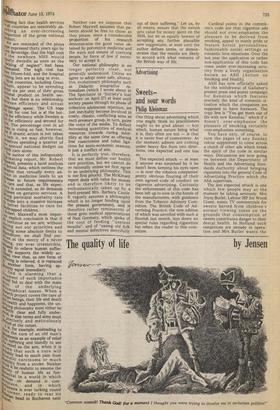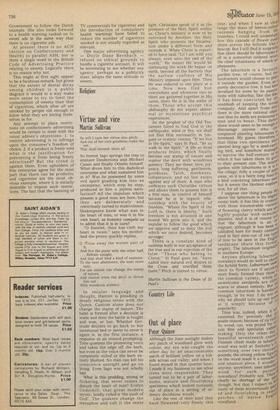Advertising
Sweets—
and sour words
Philip Kleinman
One thing about advertising which you might think its practitioners ought to be glad about — but which, human nature being what it is, they often are not — is that it is never free of controversy. At the moment admen are coming under heavy fire from two directions, one expected and one less so.
The expected attack — at least if anyone was surprised by it he hasn't been keeping his eyes open — is over the tobacco companies' pretty obvious flouting of their own agreed code of conduct on cigarette advertising. Curiously the enforcement of this code has been left up to now in the hands of the manufacturers, with guidance from the Tobacco Advisory Committee. The British Code of Advertising Practice, the new edition of which was unveiled with such a flourish last month, lays down no special rules regarding cigarettes but refers the reader to this committee. Cardinal points in the committee's code are that cigarette ads should not over-emphasise the pleasure to be derived from smoking, appeal to manly pride or feature heroic personalities, fashionable social settings or romantic love situations. Over the last year the application or rather non-application of this code has come under ever-increasing scrutiny from a lively organisation known as ASH (Action on Smoking and Health).
ASH has now officially asked for the withdrawal of Gallaher's present press and poster campaign for Kensitas which features precisely the kind of romantic situation which the companies are supposed to have forsworn. The copy line is "You get more out of life with new Kensitas," which if it doesn't over-emphasise the pleasure of smoking certainly over-emphasises something.
You have only, of course, to turn the pages of any Sunday colour supplement to come across a clutch of other ads which break the spirit of the code in similar ways. Discussions are now going on between the Department of Health and the Advertising Standards Authority about bringing cigarettes into the general Code of Advertising Practice which the ASA supervises.
The less expected attack is one which few people may at the moment be taking seriously. Mrs Joyce Butler, Labour MP for Wood Green, wants TV commercials for sweets barred from children's normal viewing times on the grounds that consumption of sweets constitutes danger to their dental health. In Holland such restrictions are already in operation and Mrs Butler wants the Government to follow the Dutch example. She also looks forward to a health warning tacked on to sweet ads in the same way that there is on cigarette ads.
At present there is no ACH (Action on Confectionery and Health) to parallel ASH, nor is there a single word in the British Code of Advertising Practice relating to sweets. Logically there is no reason why not.
This might at first sight appear to be a facetious remark, but given that the extent of dental decay among children is a public disgrace it would in a way make more sense to try to limit the consumption of sweets than that of cigarettes, which after all are smoked by people old enough to know what they are letting themselves in for.
Any attempt to place restrictions on confectionery advertising would be certain to meet with the usual admen's objections: 1. to restrict advertising is to infringe upon the consumer's freedom of choice. 2. if a product is freely sold what is the justification for preventing it from being freely advertised? But the trend is against them. Even upholders of free enterprise agree for the most part that there can be products, and cigarettes are the most obvious example, where it is socially desirable to impose such restrictions. The fact that the banning of TV commercials for cigarettes and the introduction of compulsory health warnings have failed to reduce the number of cigarettes smoked is not usually regarded as relevant.
One major advertising agency — Doyle Dane Bernbach — refuses on ethical grounds to handle a cigarette account. It will be interesting to see whether any agency, perhaps as a publicity stunt, adopts the same attitude to sweets.



































 Previous page
Previous page